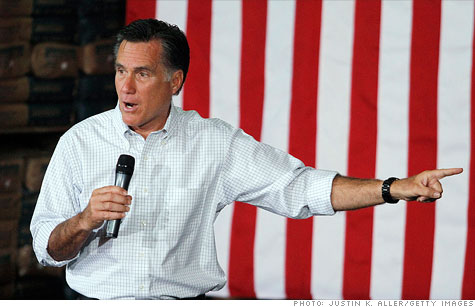Search News

Republican presidential candidiate Mitt Romney argues he deserves credit for the turnaround in the auto industry.
NEW YORK (CNNMoney) -- Mitt Romney argued against the bailout of the U.S. auto industry in 2008, in an article entitled "Let Detroit Go Bankrupt."
Now three years after the Obama administration bailed out General Motors (GM, Fortune 500) and Chrysler Group, and with U.S. auto industry sales, profits and hiring all rising, Romney believes he deserves credit for that turnaround.
"I'll take a lot of credit for the fact that this industry's come back," he told an Ohio television station Monday. "My own view is that the auto companies needed to go through bankruptcy before government help. And frankly, that's finally what the president did. He finally took them through bankruptcy."
Romney is right that the 2009 bankruptcy reorganizations at GM and Chrysler played a major role in the turnarounds at those automakers. It allowed them to shed billions in debt, along with plants, workers, brands and dealerships they could no longer afford.
And he's correct that the automakers and the United Auto Workers union were initially opposed to the bankruptcy process, uncertain that the companies would survive what they expected could be months if not years in bankruptcy court.
But the billions of dollars from the federal bailout helped the bankruptcy process get done in about two months, much faster than anyone thought was possible, said Van Conway, CEO of Conway MacKenzie, a restructuring firm in Detroit.
And Conway said the idea of a managed bankruptcy was not unique at the time. "Romney might very well have had the idea, but it's not an idea no one else had on their own," Conway said.
Other supporters of the bailouts, and even some critics of them, say that Romney deserves no credit for the turnaround, given that he opposed the federal bailout that kept the companies alive during the bankruptcy process. Without that $81 billion in funding, the companies would have been forced to go out of business and liquidate, according to those experts.
"There was no way they could get financing," said Conway. "They were burning money so fast, with no end in site, that no one but the government was going to give them money."
Steve Rattner, who served as the car czar for the Obama administration, has repeatedly said that the government was the only source of financing to keep the automakers alive through bankruptcy.
Rattner said in a recent New York Times opinion piece that he "spoke diligently to all conceivable providers of funds, and not one had the slightest interest in financing those companies on any terms."
"If Mr. Romney disagrees, he should come forward with specific names of willing investors in place of empty rhetoric," he added. "I predict that he won't be able to, because there aren't any."
While Rattner is a long-time Democratic supporter, his view is echoed by some conservative executives in the auto industry, among them Bob Lutz, who was then vice chairman of GM.
"He thinks we didn't try to borrow money from the banks," Lutz told the Detroit Free Press in February. "The banks were even more broke than we were. Who had the money?"
And even some who opposed the bailout agree with Lutz and Rattner that the government was the only source of funds during the bankruptcy process. Bill Wilson, the head of Americans for Limited Government, told CNNMoney back in February that Romney's proposal for private funding during the reorganization was a "fantasy."
A Romney campaign spokesman pointed out that the 2008 article suggested that private lenders who provided financing to the automakers would receive government loan guarantees. But the campaign did not reply to the request for the names of firms willing to finance the auto turnarounds, even with those hypothetical guarantees. ![]()